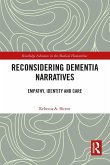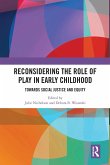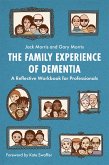Rebecca Bitenc (Germany Albert-Ludwigs-Universitat Freiburg)
Reconsidering Dementia Narratives
Empathy, Identity and Care
Rebecca Bitenc (Germany Albert-Ludwigs-Universitat Freiburg)
Reconsidering Dementia Narratives
Empathy, Identity and Care
- Gebundenes Buch
- Merkliste
- Auf die Merkliste
- Bewerten Bewerten
- Teilen
- Produkt teilen
- Produkterinnerung
- Produkterinnerung
Reconsidering Dementia Narratives explores the role of narrative in developing new ways of understanding, interacting with, and caring for people with dementia.
Andere Kunden interessierten sich auch für
![Reconsidering Dementia Narratives Reconsidering Dementia Narratives]() Rebecca BitencReconsidering Dementia Narratives41,99 €
Rebecca BitencReconsidering Dementia Narratives41,99 €![Reconsidering The Role of Play in Early Childhood Reconsidering The Role of Play in Early Childhood]() Reconsidering The Role of Play in Early Childhood58,99 €
Reconsidering The Role of Play in Early Childhood58,99 €![Reconsidering Reparations Reconsidering Reparations]() Olufemi O. Taiwo (Associate Prof Associate Professor of PhilosophyReconsidering Reparations34,99 €
Olufemi O. Taiwo (Associate Prof Associate Professor of PhilosophyReconsidering Reparations34,99 €![The Family Experience of Dementia The Family Experience of Dementia]() Gary MorrisThe Family Experience of Dementia40,99 €
Gary MorrisThe Family Experience of Dementia40,99 €![Reconsidering Patient Centred Care Reconsidering Patient Centred Care]() Alison Pilnick (UK University of Nottingham)Reconsidering Patient Centred Care106,99 €
Alison Pilnick (UK University of Nottingham)Reconsidering Patient Centred Care106,99 €![Bodies and Suffering Bodies and Suffering]() Ana Dragojlovic (Australia University of Queensland)Bodies and Suffering57,99 €
Ana Dragojlovic (Australia University of Queensland)Bodies and Suffering57,99 €![Medical Education, Politics and Social Justice Medical Education, Politics and Social Justice]() Alan BleakleyMedical Education, Politics and Social Justice58,99 €
Alan BleakleyMedical Education, Politics and Social Justice58,99 €-
-
-
Reconsidering Dementia Narratives explores the role of narrative in developing new ways of understanding, interacting with, and caring for people with dementia.
Hinweis: Dieser Artikel kann nur an eine deutsche Lieferadresse ausgeliefert werden.
Hinweis: Dieser Artikel kann nur an eine deutsche Lieferadresse ausgeliefert werden.
Produktdetails
- Produktdetails
- Routledge Advances in the Medical Humanities
- Verlag: Taylor & Francis Ltd
- Seitenzahl: 272
- Erscheinungstermin: 19. Juli 2019
- Englisch
- Abmessung: 163mm x 242mm x 16mm
- Gewicht: 538g
- ISBN-13: 9780367151348
- ISBN-10: 0367151340
- Artikelnr.: 57174638
- Herstellerkennzeichnung
- Libri GmbH
- Europaallee 1
- 36244 Bad Hersfeld
- gpsr@libri.de
- Routledge Advances in the Medical Humanities
- Verlag: Taylor & Francis Ltd
- Seitenzahl: 272
- Erscheinungstermin: 19. Juli 2019
- Englisch
- Abmessung: 163mm x 242mm x 16mm
- Gewicht: 538g
- ISBN-13: 9780367151348
- ISBN-10: 0367151340
- Artikelnr.: 57174638
- Herstellerkennzeichnung
- Libri GmbH
- Europaallee 1
- 36244 Bad Hersfeld
- gpsr@libri.de
Rebecca A. Bitenc completed her PhD on 'Dementia Narratives in Contemporary Literature, Life-Writing and Film' at Durham University, UK. Her research interests include critical medical humanities, narratology, and narrative ethics. She is a member of the Dementia and Cultural Narratives Network and the Northern Network for Medical Humanities Research. She has an M.A. in English, French and Psychology from Albert-Ludwigs-Universität, Germany.
Acknowledgements
Preface
List of Illustrations
Introduction: Reconsidering Dementia Narratives
Two Starting Points
Why Narrative?
Biomedicine and the Cultural Meaning of Dementia
A Brief History of Dementia
Demography and Demonization
Reconsidering Dementia: Reparative Moves
The Alzheimer's 'Epidemic': Care, Cost and Social Justice
Literary Dementia Studies and the Medical Humanities
Illness Narratives: Countering Master Narratives and Exploring the Experience of Illness
Outline of Chapters
Part I Storytelling, Experience and Empathy
Chapter 1 Narrating Experiences of Dementia: Embodied Selves, Embodied Communication
Embodied Selves, Embodied Communication
Inside Views: Life Writing by People with Early-Onset Dementia
Memory
Language
Perception, Movement and the Senses
Emotions and Cognition
Time
The Social World: Intimate Relationships and Strangers
The Experience of Flow in Dementia
From the Caregiver's Perspective: Intersubjectivity in David Sieveking's Documentary Vergiss Mein Nicht
Viewing Symptoms of Dementia
The Communicating Body in Film
Embodied Selves and Relational Selves
Conclusion
Chapter 2 From the Outside in? Experience and Empathy in Fictional Dementia Narratives
Still Alice: From Fiction to Film
Experiencing Dementia/Experimenting with the Novel
Out of Mind
House Mother Normal
The Unconsoled
Concluding Reflections on Narrative Empathy
Part II Life Writing, Self-Writing and Creating Identities
Chapter 3 Life Writing at the Limits: Narrative Identity and Counter-Narratives in Dementia
Narrative Identity in Dementia: Friend or Foe?
Reconsidering Master and Counter-Narratives
The Problem of Counter-Narratives in Dementia: Reading First-Person Accounts by People with Dementia
Coherence in 'Broken' Counter-Narratives: 'Mrs Mill' and Other Stories
Janet's Story: Confabulation, Continuity, and Agency
Counter-Narratives in Context: The Editor's Role
Conclusion
Chapter 4 Relational Identity in (Filial) Caregivers' Memoirs
The Aesthetics, Ethics, and Politics of Caregivers' Memoirs
Gender, Genre and the Self: Rethinking Relational Identity in Dementia
My Father's Brain
Do You Remember Me? A Father, a Daughter, and a Search for the Self
Tangles: A Story about Alzheimer's, My Mother, and Me
Conclusion
Part III Narrating Dementia/Rethinking Care
Chapter 5 Care-Writing Reconsidered: Towards a New Practice of Dementia Care
Exploring Caregivers' Dilemmas
Care or Coercion? Autonomy in Dementia
'Bad Grooming': Intimate Care in Dementia
'No Good Choices': Institutionalisation in Dementia
Imagining Alternative Approaches in Dementia Care
Reconsidering Confabulation
The Power of Music
From Control to Letting Go: Being With vs. Symptom Management
Challenging Care Practice
Conclusion
Chapter 6 Making Readers Care: Bioethics and the Novel
Ethics and the Novel: Countering, Stereotyping and Disturbing
Scar Tissue: Biomedicine and the Hermeneutics of Selfhood
Narrative and Neuroimaging: Raising Epistemological Questions
House Mother Normal: Disturbing Care
Exploring Bioethics: 'Living Through' as 'Thinking Through'
Still Alice: (Precedent) Autonomy and Suicide in Dementia
Mode, Medium and the Suicide Plot
Have the Men Had Enough? Gender and the Economies of Care
Conclusion
Dementia Narratives and Beyond
Index
Preface
List of Illustrations
Introduction: Reconsidering Dementia Narratives
Two Starting Points
Why Narrative?
Biomedicine and the Cultural Meaning of Dementia
A Brief History of Dementia
Demography and Demonization
Reconsidering Dementia: Reparative Moves
The Alzheimer's 'Epidemic': Care, Cost and Social Justice
Literary Dementia Studies and the Medical Humanities
Illness Narratives: Countering Master Narratives and Exploring the Experience of Illness
Outline of Chapters
Part I Storytelling, Experience and Empathy
Chapter 1 Narrating Experiences of Dementia: Embodied Selves, Embodied Communication
Embodied Selves, Embodied Communication
Inside Views: Life Writing by People with Early-Onset Dementia
Memory
Language
Perception, Movement and the Senses
Emotions and Cognition
Time
The Social World: Intimate Relationships and Strangers
The Experience of Flow in Dementia
From the Caregiver's Perspective: Intersubjectivity in David Sieveking's Documentary Vergiss Mein Nicht
Viewing Symptoms of Dementia
The Communicating Body in Film
Embodied Selves and Relational Selves
Conclusion
Chapter 2 From the Outside in? Experience and Empathy in Fictional Dementia Narratives
Still Alice: From Fiction to Film
Experiencing Dementia/Experimenting with the Novel
Out of Mind
House Mother Normal
The Unconsoled
Concluding Reflections on Narrative Empathy
Part II Life Writing, Self-Writing and Creating Identities
Chapter 3 Life Writing at the Limits: Narrative Identity and Counter-Narratives in Dementia
Narrative Identity in Dementia: Friend or Foe?
Reconsidering Master and Counter-Narratives
The Problem of Counter-Narratives in Dementia: Reading First-Person Accounts by People with Dementia
Coherence in 'Broken' Counter-Narratives: 'Mrs Mill' and Other Stories
Janet's Story: Confabulation, Continuity, and Agency
Counter-Narratives in Context: The Editor's Role
Conclusion
Chapter 4 Relational Identity in (Filial) Caregivers' Memoirs
The Aesthetics, Ethics, and Politics of Caregivers' Memoirs
Gender, Genre and the Self: Rethinking Relational Identity in Dementia
My Father's Brain
Do You Remember Me? A Father, a Daughter, and a Search for the Self
Tangles: A Story about Alzheimer's, My Mother, and Me
Conclusion
Part III Narrating Dementia/Rethinking Care
Chapter 5 Care-Writing Reconsidered: Towards a New Practice of Dementia Care
Exploring Caregivers' Dilemmas
Care or Coercion? Autonomy in Dementia
'Bad Grooming': Intimate Care in Dementia
'No Good Choices': Institutionalisation in Dementia
Imagining Alternative Approaches in Dementia Care
Reconsidering Confabulation
The Power of Music
From Control to Letting Go: Being With vs. Symptom Management
Challenging Care Practice
Conclusion
Chapter 6 Making Readers Care: Bioethics and the Novel
Ethics and the Novel: Countering, Stereotyping and Disturbing
Scar Tissue: Biomedicine and the Hermeneutics of Selfhood
Narrative and Neuroimaging: Raising Epistemological Questions
House Mother Normal: Disturbing Care
Exploring Bioethics: 'Living Through' as 'Thinking Through'
Still Alice: (Precedent) Autonomy and Suicide in Dementia
Mode, Medium and the Suicide Plot
Have the Men Had Enough? Gender and the Economies of Care
Conclusion
Dementia Narratives and Beyond
Index
Acknowledgements
Preface
List of Illustrations
Introduction: Reconsidering Dementia Narratives
Two Starting Points
Why Narrative?
Biomedicine and the Cultural Meaning of Dementia
A Brief History of Dementia
Demography and Demonization
Reconsidering Dementia: Reparative Moves
The Alzheimer's 'Epidemic': Care, Cost and Social Justice
Literary Dementia Studies and the Medical Humanities
Illness Narratives: Countering Master Narratives and Exploring the Experience of Illness
Outline of Chapters
Part I Storytelling, Experience and Empathy
Chapter 1 Narrating Experiences of Dementia: Embodied Selves, Embodied Communication
Embodied Selves, Embodied Communication
Inside Views: Life Writing by People with Early-Onset Dementia
Memory
Language
Perception, Movement and the Senses
Emotions and Cognition
Time
The Social World: Intimate Relationships and Strangers
The Experience of Flow in Dementia
From the Caregiver's Perspective: Intersubjectivity in David Sieveking's Documentary Vergiss Mein Nicht
Viewing Symptoms of Dementia
The Communicating Body in Film
Embodied Selves and Relational Selves
Conclusion
Chapter 2 From the Outside in? Experience and Empathy in Fictional Dementia Narratives
Still Alice: From Fiction to Film
Experiencing Dementia/Experimenting with the Novel
Out of Mind
House Mother Normal
The Unconsoled
Concluding Reflections on Narrative Empathy
Part II Life Writing, Self-Writing and Creating Identities
Chapter 3 Life Writing at the Limits: Narrative Identity and Counter-Narratives in Dementia
Narrative Identity in Dementia: Friend or Foe?
Reconsidering Master and Counter-Narratives
The Problem of Counter-Narratives in Dementia: Reading First-Person Accounts by People with Dementia
Coherence in 'Broken' Counter-Narratives: 'Mrs Mill' and Other Stories
Janet's Story: Confabulation, Continuity, and Agency
Counter-Narratives in Context: The Editor's Role
Conclusion
Chapter 4 Relational Identity in (Filial) Caregivers' Memoirs
The Aesthetics, Ethics, and Politics of Caregivers' Memoirs
Gender, Genre and the Self: Rethinking Relational Identity in Dementia
My Father's Brain
Do You Remember Me? A Father, a Daughter, and a Search for the Self
Tangles: A Story about Alzheimer's, My Mother, and Me
Conclusion
Part III Narrating Dementia/Rethinking Care
Chapter 5 Care-Writing Reconsidered: Towards a New Practice of Dementia Care
Exploring Caregivers' Dilemmas
Care or Coercion? Autonomy in Dementia
'Bad Grooming': Intimate Care in Dementia
'No Good Choices': Institutionalisation in Dementia
Imagining Alternative Approaches in Dementia Care
Reconsidering Confabulation
The Power of Music
From Control to Letting Go: Being With vs. Symptom Management
Challenging Care Practice
Conclusion
Chapter 6 Making Readers Care: Bioethics and the Novel
Ethics and the Novel: Countering, Stereotyping and Disturbing
Scar Tissue: Biomedicine and the Hermeneutics of Selfhood
Narrative and Neuroimaging: Raising Epistemological Questions
House Mother Normal: Disturbing Care
Exploring Bioethics: 'Living Through' as 'Thinking Through'
Still Alice: (Precedent) Autonomy and Suicide in Dementia
Mode, Medium and the Suicide Plot
Have the Men Had Enough? Gender and the Economies of Care
Conclusion
Dementia Narratives and Beyond
Index
Preface
List of Illustrations
Introduction: Reconsidering Dementia Narratives
Two Starting Points
Why Narrative?
Biomedicine and the Cultural Meaning of Dementia
A Brief History of Dementia
Demography and Demonization
Reconsidering Dementia: Reparative Moves
The Alzheimer's 'Epidemic': Care, Cost and Social Justice
Literary Dementia Studies and the Medical Humanities
Illness Narratives: Countering Master Narratives and Exploring the Experience of Illness
Outline of Chapters
Part I Storytelling, Experience and Empathy
Chapter 1 Narrating Experiences of Dementia: Embodied Selves, Embodied Communication
Embodied Selves, Embodied Communication
Inside Views: Life Writing by People with Early-Onset Dementia
Memory
Language
Perception, Movement and the Senses
Emotions and Cognition
Time
The Social World: Intimate Relationships and Strangers
The Experience of Flow in Dementia
From the Caregiver's Perspective: Intersubjectivity in David Sieveking's Documentary Vergiss Mein Nicht
Viewing Symptoms of Dementia
The Communicating Body in Film
Embodied Selves and Relational Selves
Conclusion
Chapter 2 From the Outside in? Experience and Empathy in Fictional Dementia Narratives
Still Alice: From Fiction to Film
Experiencing Dementia/Experimenting with the Novel
Out of Mind
House Mother Normal
The Unconsoled
Concluding Reflections on Narrative Empathy
Part II Life Writing, Self-Writing and Creating Identities
Chapter 3 Life Writing at the Limits: Narrative Identity and Counter-Narratives in Dementia
Narrative Identity in Dementia: Friend or Foe?
Reconsidering Master and Counter-Narratives
The Problem of Counter-Narratives in Dementia: Reading First-Person Accounts by People with Dementia
Coherence in 'Broken' Counter-Narratives: 'Mrs Mill' and Other Stories
Janet's Story: Confabulation, Continuity, and Agency
Counter-Narratives in Context: The Editor's Role
Conclusion
Chapter 4 Relational Identity in (Filial) Caregivers' Memoirs
The Aesthetics, Ethics, and Politics of Caregivers' Memoirs
Gender, Genre and the Self: Rethinking Relational Identity in Dementia
My Father's Brain
Do You Remember Me? A Father, a Daughter, and a Search for the Self
Tangles: A Story about Alzheimer's, My Mother, and Me
Conclusion
Part III Narrating Dementia/Rethinking Care
Chapter 5 Care-Writing Reconsidered: Towards a New Practice of Dementia Care
Exploring Caregivers' Dilemmas
Care or Coercion? Autonomy in Dementia
'Bad Grooming': Intimate Care in Dementia
'No Good Choices': Institutionalisation in Dementia
Imagining Alternative Approaches in Dementia Care
Reconsidering Confabulation
The Power of Music
From Control to Letting Go: Being With vs. Symptom Management
Challenging Care Practice
Conclusion
Chapter 6 Making Readers Care: Bioethics and the Novel
Ethics and the Novel: Countering, Stereotyping and Disturbing
Scar Tissue: Biomedicine and the Hermeneutics of Selfhood
Narrative and Neuroimaging: Raising Epistemological Questions
House Mother Normal: Disturbing Care
Exploring Bioethics: 'Living Through' as 'Thinking Through'
Still Alice: (Precedent) Autonomy and Suicide in Dementia
Mode, Medium and the Suicide Plot
Have the Men Had Enough? Gender and the Economies of Care
Conclusion
Dementia Narratives and Beyond
Index








